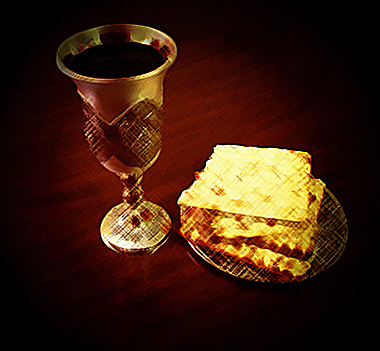No man is an island—
Entire of itself,
Every man is a piece of the continent,
A part of the main.
And therefore never send to know for whom the bell tolls;
It tolls for thee. —John Donne
[2col1]You cannot take communion alone.
The word communion implies sharing; as in the sense of community and relationships that work together. Unlike other disciplines of worship, you cannot partake of communion alone. Private prayer and bible study and even singing are encouraged. This will foster greater intimacy between you and the Lord. But communion is entirely different.
Consider Paul’s teaching regarding communion—
The cup of blessing which we bless, is it not the communion of the blood of Christ? The bread which we break, is it not the communion of the body of Christ? For we being many are one bread, and one body: for we are all partakers of that one bread. —1 Corinthians 10:16-17
Look at Paul’s rebuke of the Corinthians in the next chapter—
But in the following instructions I do not commend you, because when you come together it is not for the better but for the worse. For, in the first place, when you come together as a church, I hear that there are divisions among you. . . .
When you come together, it is not the Lord’s Supper that you eat. For in eating, each one goes ahead with his own meal. One goes hungry, another gets drunk. What! Do you not have houses to eat and drink in? Or do you despise the church of God and humiliate those who have nothing? What shall I say to you? Shall I commend you in this? No, I will not. For I received from the Lord what I also delivered to you, that the Lord Jesus on the night when he was betrayed took bread, and when he had given thanks, he broke it, and said, “This is my body which is for you. Do this in remembrance of me.” In the same way also he took the cup, after supper . . .
Let a person examine himself, then, and so eat of the bread and drink of the cup. For anyone who eats and drinks without discerning the body eats and drinks judgment on himself. So then, my brothers, when you come together to eat, wait for one another—if anyone is hungry, let him eat at home—so that when you come together it will not be for judgment. —1 Corinthians 11:17-34 ESV
One of the major problems in Corinth was regarding communion. In fact, Paul accuses them of not partaking of the Lord’s Supper at all. It wasn’t that they weren’t eating unleavened bread and drinking fruit of the vine. They certainly were going through the motions. But the spirit in which they followed the command prohibited them from fulfilling their worship.
What was Paul’s solution? To partake alone? To partake in your own home where your personal thoughts about Christ’s sacrifice wouldn’t be hindered by others? No! In fact, the solution is quite the opposite.
Wait for one another (verse 33). Share it; with everyone, together, at the same time, without division, without selfishness. Examining oneself and partaking in a worthy manner as defined by the context of this passage means that we share it.
[endcol] [2col2]We have many customs by which we show hospitality and compassion for one another in our common meals. Pass the food to your guests first. Do not take more than your share as the dish passes. Before taking the last piece of food consider whether anyone else cares for more.
At this local church, I am not concerned that someone will take more than their share of the bread or fruit of the vine. We have enough for everyone to partake. The purpose of this study is to raise awareness that we are communing with each other at the Lord’s Table. If we are not communing with each other, then we cannot call it the Lord’s Table but something less meaningful.
At this local church, I partake of the communion together with the local body of believers as instructed in the New Testament. We happen to do it quietly. Most of us are silent and contemplative. But if I am closed minded toward my brothers and sisters, is it the Lord’s Supper that I partake?
I am not saying we must have a discussion during the communion, but in fact it is our custom for one individual to offer some thoughts before the Lord’s Table so that we can focus our minds. So I offer these thoughts in an effort to focus our minds on the fact that we are sharing this meal as a family.
One may look upon the passing of the trays of bread and fruit of the vine as rather simple, benign, or obviously necessary. But it is so very important. That is precisely what Jesus did when he instituted this memorial at the last Passover with his disciples. He passed the bread and the cup; to Peter, James, John, Matthew and so forth. Did Matthew gobble it all down for himself and leave the rest empty-handed? Of course not! They shared a precious moment with their Lord and Savior and with each other. How powerful!
As the bread and cup are passed between us, we share it with one another and we are woven together much like a quilt. Christ’s body and blood bind us together into something larger and more beautiful.
I see a parallel in the human body. We are tied together by a vascular system. Tunnels penetrate every part of our bodies delivering blood, enabling all of our parts to get the vital oxygen and nutrients needed to survive. In the Lord’s Supper, the power of Christ’s body and blood circulates through us and fills us with life. That is if we share it.
Would you put a tourniquet around your healthy arm? That sounds ridiculous! Tightening a tourniquet around your arm cuts off vitality to your limb. It will atrophy and get infected; eventually your arm will die and fall off. Sound familiar? Corinth had the same problem. Is it any wonder many were weak and ill, and some had died (verse 30)? It is as if a tourniquet had been tied around a portion of the body of Christ in Corinth and they were choked to death; because they did not share the body and blood of our Lord.
May it never be at any local church where any of us may worship. I am thankful for my church family with whom I commune. I am thankful that we share the body and blood of Christ. I hope you feel the same way. Next time you partake of communion, consider what you are doing. You are communing with Christ and with the members of His body. Consider their well-being and share with them. Put your arm around them, hold their hand, or say a prayer for them.
You cannot take communion alone.
[endcol] [clearcol]

